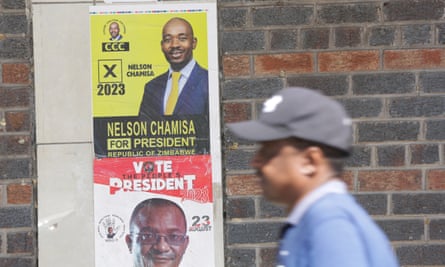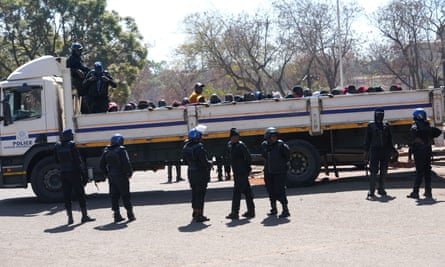The Citizens Coalition for Change (CCC) activists – mostly young women – had been arrested for attending a car rally on the outskirts of the capital earlier in the week. Despite spending more than 24 hours in police cells, some still summoned the strength to wave an index finger – the CCC party symbol – to family and friends who had gathered in support.
A woman urinated in the crammed truck as police looked on.
“It has been a tough two days, but we remain strong,” one activist shouted.
Zimbabweans go the polls on Wednesday in combined presidential, parliamentary and local elections, amid acute concern over an intensifying crackdown on the main opposition party and its supporters.
Twelve candidates are running for the presidency, but the competition is essentially a re-run of the 2018 race between the president, Emmerson Mnangagwa, 80, and the CCC leader, Nelson Chamisa, 45, in a country beset by corruption, inflation, poverty and unemployment.

Human rights organisations have reported growing repression, casting doubt on the credibility of the polls.
“We have seen people being assaulted and arrested,” said Wilbert Mandinde, head of the Zimbabwe Human Rights NGO forum. “It is worrying that opposition members are spending most of their time in the courtrooms rather than on the ground campaigning.”
Mandinde said suppression of opposition was more intense than in the runup to the 2018 election.
The CCC’s Chamisa is trying for a second time to break Zanu-PF’s 43-year stranglehold on power. He spent last Tuesday afternoon at the funeral for a supporter who had died during an ambush by suspected ruling party supporters on people heading to a CCC campaign rally west of Harare.
“It is painful when you look at these little children. You have taken one of their parents. He never fought anyone,” Chamisa said at the wake for Tinashe Chitsunge. Police have arrested 10 suspects in connection with Chitsunge’s death.
Chamisa, who has previously described the choice for voters, particularly in rural areas, as “death or Zanu-PF”, faced hurdles on the campaign trail. Several opposition rallies have been banned, and police have fired teargas at supporters on at least one occasion.
Mnangagwa was sworn in as president in 2017 after Robert Mugabe’s removal in a coup, and narrowly won elections held the following year. A close aide of Mugabe, he had been implicated in atrocities committed under his predecessor’s rule.

Mnangagwa has maintained a rhetoric of peace and tolerance in the runup to the election but the local thinktank Zimbabwe Democracy Institute (ZDI) says rights violations are being registered, especially in the countryside.
“They [Zanu-PF] are mobilising cohesively in rural areas for people to vote under their village head, which we call command voting. That is something we have observed,” the ZDI director, Pedzisai Ruhanya, said.
Christopher Mutsvangwa, a Zanu-PF spokesperson, defended the arrest of opposition supporters.
“There is nobody in Zimbabwe who is in jail for political activism. It is law and order. The same mentality that says we can fight and make a statement is the one which makes people think they can challenge the police and the army,” Mutsvangwa said.
Among its numerous complaints about the electoral process, the opposition has accused the electoral commission of not releasing the full voters’ roll and said it is not receiving airtime on Zimbabwe’s public broadcaster.
For many ordinary citizens, perennial economic problems remain the primary concern.
On a recent afternoon in central Harare, Marian Musekwa, 43, sat uncomfortably on a wooden bench on the corner of Robert Mugabe Street, where she had set up a makeshift stall. Pop-up street shops have become a common sight on the street, as Zimbabweans battle to eke out a living.
Musekwa, who has four children, sells basic goods smuggled from neighbouring South Africa. “My goods are cheaper so customers prefer coming here instead of going to the shops,” she said.
When dusk sets in, the streets fill with people buying and selling in a parallel economy.
“We hardly have any problems with the police around this time,” Musekwa said.
Despite slowing down in July, inflation remains among the highest in the world at 101.3%.

Mnangagwa, who promised to tackle the unending economic crisis “head on” in 2018, has been accused of failing to turn fortunes around.
The opposition hopes the waning economy and about a million first-time voters will increase its vote share. In his latest manifesto, For Everyone, Chamisa promised to deal with corruption, open new lines of credit with international financial institutions, create employment and end poverty.
For now Musekwa’s ambition is to survive another day. “There is no time to rest, my children have to eat,” she said as she served a customer.



